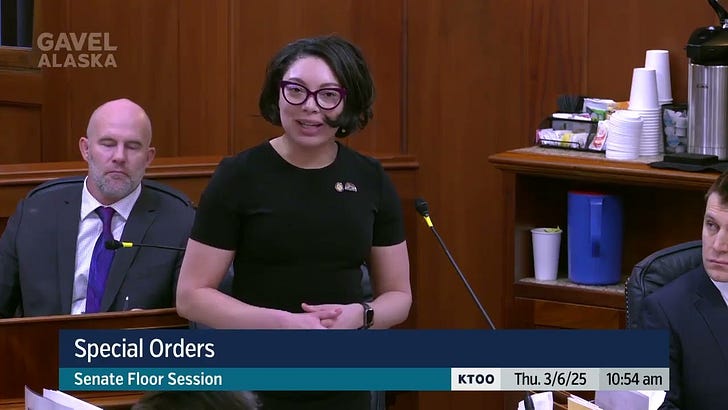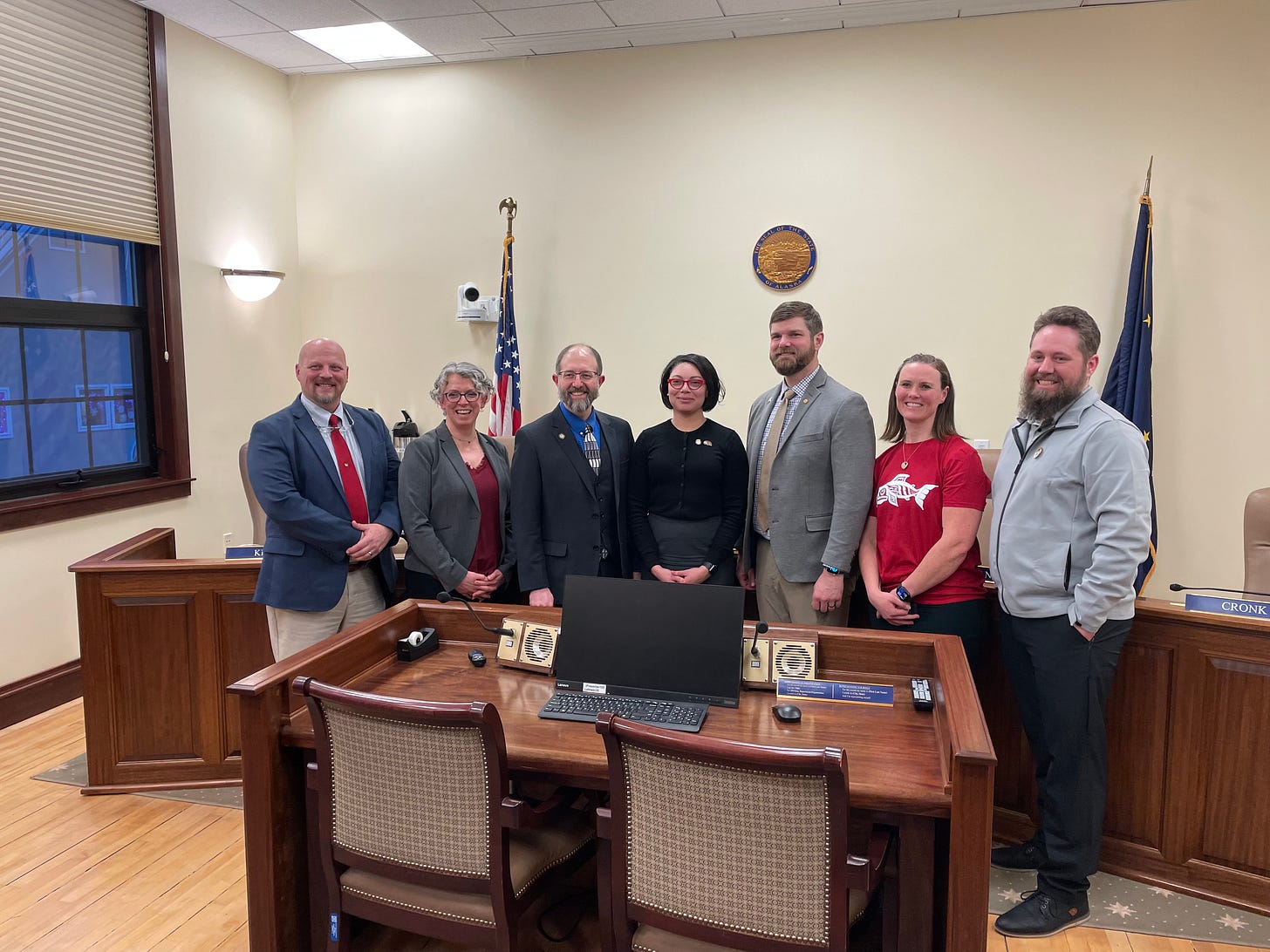Dear friends and neighbors,
This week, the required reading for my PS 603 course, which focused on equity and efficiency in public policy, has been particularly relevant to our community. As we continue to witness policy choices and bombastic posturing in Washington, D.C., that threaten the security and safety of our friends and neighbors, the insights from this course have provided a valuable perspective. I look forward to reading more of Deborah Stone’s writings entitled The Policy Paradox (2011).
Although we are in troubling times and folks may feel overwhelmed or challenged, please remember there are bright spots.
One of those bright spots is Senator Giessel’s idea to share stories of influential women during our Senate Floor sessions throughout Women’s History Month.
This week, I had the opportunity to uplift the story of Etheldra Davis, the first Anchorage School District black teacher and principal. Her life and legacy are a testament to resilience and determination. I was privileged to share her story on the floor of the Alaska State Senate, a moment that I hope provides inspiration to you.
Happy Birthday Peace Corps
On March 1, 1961, President John F. Kennedy established the U.S. Peace Corps. Since then, at the invitation of foreign governments, more than 240,000 Americans have served the United States and countries around the globe as Peace Corps Volunteers.
More than 3,000 Volunteers are working alongside community members in 60+ countries, tackling local development priorities across the Peace Corps’ six work sectors: Agriculture, Community Economic Development, Education, Environment, Health, and Youth in Development.
I am proud to be one of two Returned Peace Corps Volunteers serving in the Alaska State Legislature (the second is Senator Forrest Dunbar—our Peace Corps-centric podcast releases this Sunday!).
I began my service under the Bush Administration and spent an extended period (3.5 years) in Azerbaijan as a Youth Development Volunteer. I completed my master’s degree through the Peace Corps Master’s International Program at the University of Alaska Fairbanks and returned to Alaska in 2011.
To learn more about the Peace Corps and the work of its volunteers across the globe, visit www.peacecorps.gov

Education Update
On Thursday, the House of Representatives tried to move an amended version of House Bill 69, an act to increase base student funding, toward a full floor vote. Unfortunately, the House Minority Caucus' delay tactics prevented the bill from progressing.
I anticipate amendments to HB 69 and a full floor vote taking up most of the House of Representatives calendar in the coming week. To stay up-to-date, text HB 69 to 559-245-2529 to enroll in text alerts.
What’s new in House Bill 69?
House Bill 69 underwent major changes in the House Rules Committee, including the addition of several education-related policies. It is atypical to amend legislation in Rules Committees, and without an opportunity for the public to weigh in, I have my reservations and concerns about the language added to HB 69. I look forward to the legislation making its way to the Senate and to further discussions on this bill.
The legislation now includes:
Legislative intent stating nothing in the bill is meant to establish a statewide voucher program.
A significant change in Alaska’s school enrollment policy states that a student has a right to attend a public school within their school district boundary OR any school as long as there is space. The bill language requires schools to establish a lottery system to admit students outside their borders—effectively overriding any specific application processes established by a school. It would also allow a non-district student admission over an in-district student, and adds more reporting requirements to schools, which grows administrative overhead.
Reduction in the review time for an appeal to a revoked charter school application by the State Board of Education and a requirement for the school district to explain why the application was denied.
An increase in the percentage of the administrative overhead a school district can retain from a charter school, and language to permit charter schools to retain a 10% fund balance.
Express permission for a district to renew a charter school for successive terms.
The bill proposes a $450 incentive for every K-6th grade student who scores proficiently or shows improvement in reading. However, this approach raises concerns as it may inadvertently direct resources away from struggling readers who need after-school tutoring and summer school access, and towards those who are already performing well.
Requirements for correspondence programs to report on their student count, the curricula purchased, their finances, student assessment data, and allotment uses.
Personal cell phone ban in schools.
The bill establishes a legislative task force with the purpose of reviewing education policies and funding, and offering improvement recommendations.
This bill requires the Alaska Department of Education and Early Development to produce a report recommending ways to reduce the administrative burden on school districts.
Overall, there are components of the legislation that sound promising and others that will require additional scrutiny. This new version of HB 69 has been noticed for introduction on the floor of the Alaska State House for this coming Monday.




